CONNECTION TO EXPERIENCE
I tried to implement Spanish into my daily life as much as possible. This could involve changing my phone language, watching Spanish movies or TV shows with my son, or listening to Spanish podcasts. These immersion activities have complemented my academic learning and helped me to gain a deeper understanding of the language. I would learn new verb tenses and try using them in daily conversations or write short sentences incorporating the structures. Engaging in group activities that encourage the sharing of experiences and discussing topics in pairs or small groups allowed me to learn from my peers and apply collective knowledge to various situations.
CONNECTION TO DISCIPLINE
By weaving my personal experiences into my academic learning, I not only make the material more meaningful to myself but also contribute unique perspectives to my classmates. This integration of experience and knowledge will likely enrich my overall language learning journey. I took a few of the tutoring classes on campus to gain another perspective outside of the class while still relating to my class experiences because those were student led sessions.
TRANSFER
My classroom learning experiences included cultural aspects of the Spanish-speaking world. Transferring these cultural insights by applying them when interacting with people from Spanish-speaking countries or participating in cultural events helps to make things stick. When I go out to eat at a Mexican or Columbian restaurant I engage the workers in their language and make sure I use proper pronunciation. It sort of bridges the gap between us created by the language divide. I have even added a few people on a popular app called WhatsApp since our numbers are from different countries.
INTEGRATED COMMUNICATION
I try to remain aware of cultural nuances and norms. After retaining cultural context I know it’s crucial for effective communication, especially in professional and civic settings where cultural sensitivity is essential. I stay informed about current events in Spanish-speaking countries using an app called Linguistica. This not only broadens my knowledge but also helps you discuss relevant topics in both academic and civic settings. I place my focus on clear articulation, appropriate tone, and effective use of language.
REFLECTION AND SELF-ASSESMENT
I see myself fluent in Spanish in no more than 5 years. I want to travel to some Ecotourism sites like Chile and Paraguay and put what I have learned to the test. I have met multiple Spanish speaking people and even built some meaningful friendships that I will continue to build upon. Right now I’m leaning the basics but I will be speaking Spanish as my second language in no time. I plan to be able to add that to my Resume so I can be a journalist in Spanish speaking communities as well.
Exploring Culture
One thing I remember about the culture in Guatamala is their love of music and dance. They have a musical and cultural instrument called the Marimba. This is a very popular instrument in the more urban communities. I now know they have instruments in their Urban areas which are not so widely used just like I do in mine. I also like how closely music brings them as a community as it does for me and my community and family.
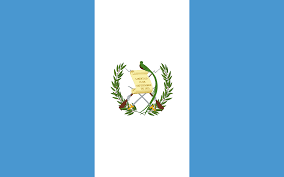
In Bolivia they have a great interest in Literature. A strong example of this is Bolivian song writer, journalist, and poet. He still remains a widely referred to educator of your people in the country as well. I don’t have any challenges from this new perspective, only inspiration. Now I want to know even more about the Spanish community’s journalism and education practices as a whole!
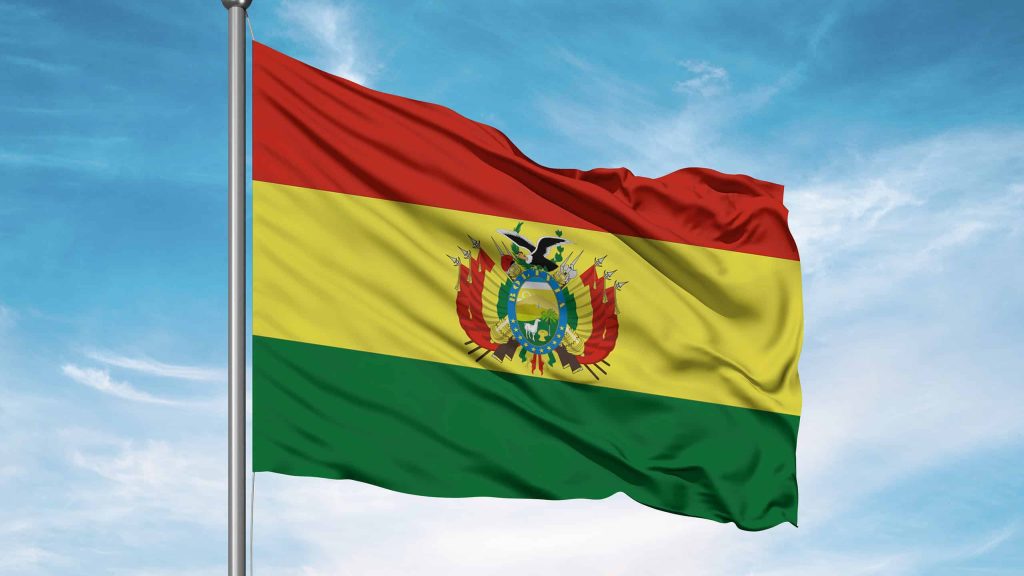
Engaging in Communities
Engaging in both my immediate and global Spanish-speaking communities holds immense value and importance in my personal and academic journey. Locally, involvement in my immediate Spanish-speaking community fosters a sense of belonging and cultural enrichment. It provides me with opportunities to practice the language authentically, understand local customs, and build meaningful connections with individuals who share a common language and cultural background.
Participating in the global Spanish-speaking community expands the scope of my interactions, introducing me to diverse perspectives, traditions, and linguistic nuances from around the world. This global engagement not only enhances my language skills but also broadens my understanding of the rich tapestry of Spanish-speaking cultures.
Interpersonal Communication
I had my final TalkAbroad conversation with Monica from Costa Rica. The topic was Art and emigration. The discussion was one I enjoyed.
In the audio I find myself getting stuck when I can’t express my thoughts. I tend to get nervous. When I replayed the audio I noticed I slowed my responses down to regain control of what I wanted to say. I was proud of the way I stayed on topic. I learned of a local artist in the area named George Jimenez. Next time I will try to avoid saying “umm” or “uhhh” and instead take a pause and complete the thought. I can still see my growth.
Presentational Speaking
I completed this video about a family vacation to a beautiful ecotourism destination in Puerto Rico. I spoke about how we spent our time at a gorgeous resort.
I really enjoyed doing this video because the topic was an interesting one. Who doesn’t love vacationing. It was slightly challenging because of the length of the video. The longer I went the harder it was to stay on point and find the words. I’ve been practicing with my vocabulary though. I think my energy is the best part of the video. Tone of voice, body movements, and facial expressions really helped me convey my attitude towards the topic. Next time I won’t worry so much and the words will come easier.
Presentational Writing
The board below is used the interactive survey Tu Moda a Tu Manera provided in Unit 11 to create a style guide. Essentially, it’s a box with an outfit that I put together from a customer profile by reading their likes and dislikes as they pertain to their bodies and tastes in clothing.
Doing this project gave me the opportunity to grow creatively. I used a tool called Freeform to put together this board. When I was writing I noticed I was having issue making my verb and noun agree. Once the project was complete and I was given the chance to make corrections it made sense? I made corrections and this was the finished product. I excelled creatively but next time I could afford to go over my description and make sure everything is written in Spanish.

After the class was introduced to microcuenta we were assigned a project in which we were to use a historical event and create a short story of our own. Below is my short story. It is a spin off of an actual historic event. I changed names, dates, and characters, however, the Eiffel Tower was really sold by a scammer.
After this I feel like a tru wordsmith. I can spin a web. It also felt good to bring awareness to an event that most people don’t know happened and have a hard time believing it did after they read about it. My challenge was to figure out a way to leave the core of the story intact but make it mine creatively. I brought the present into the past with a few of the characters names who are still living to this day. Next time I need to explain the significance better.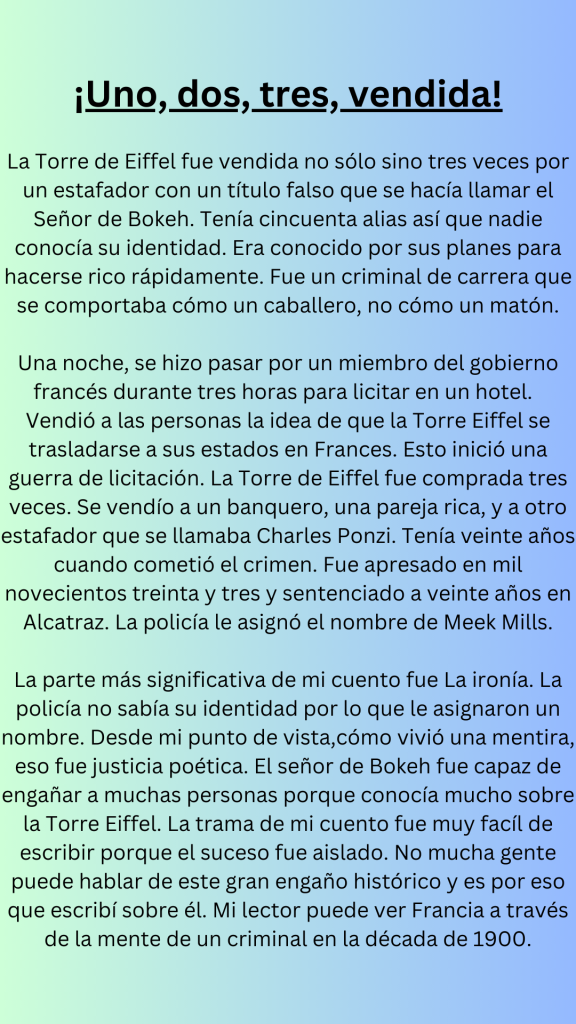
Finita La Gringa is a book which I were provided an exempt on. From that except I was tasked with continuing the story of a girl who migrated to the US with her mother and had to leave her father behind in Cuba.
I described how her situation made her feel and how she was nostalgic. I had a bit of trouble with the vocabulary in this section? I had to make my own notecards because I really needed to use some of the phrases to make the story make sense? I like to write so I was happy to use that skill to connect Finita back to her father who she had been estranged from in the story? I could still use some work on my ending though.
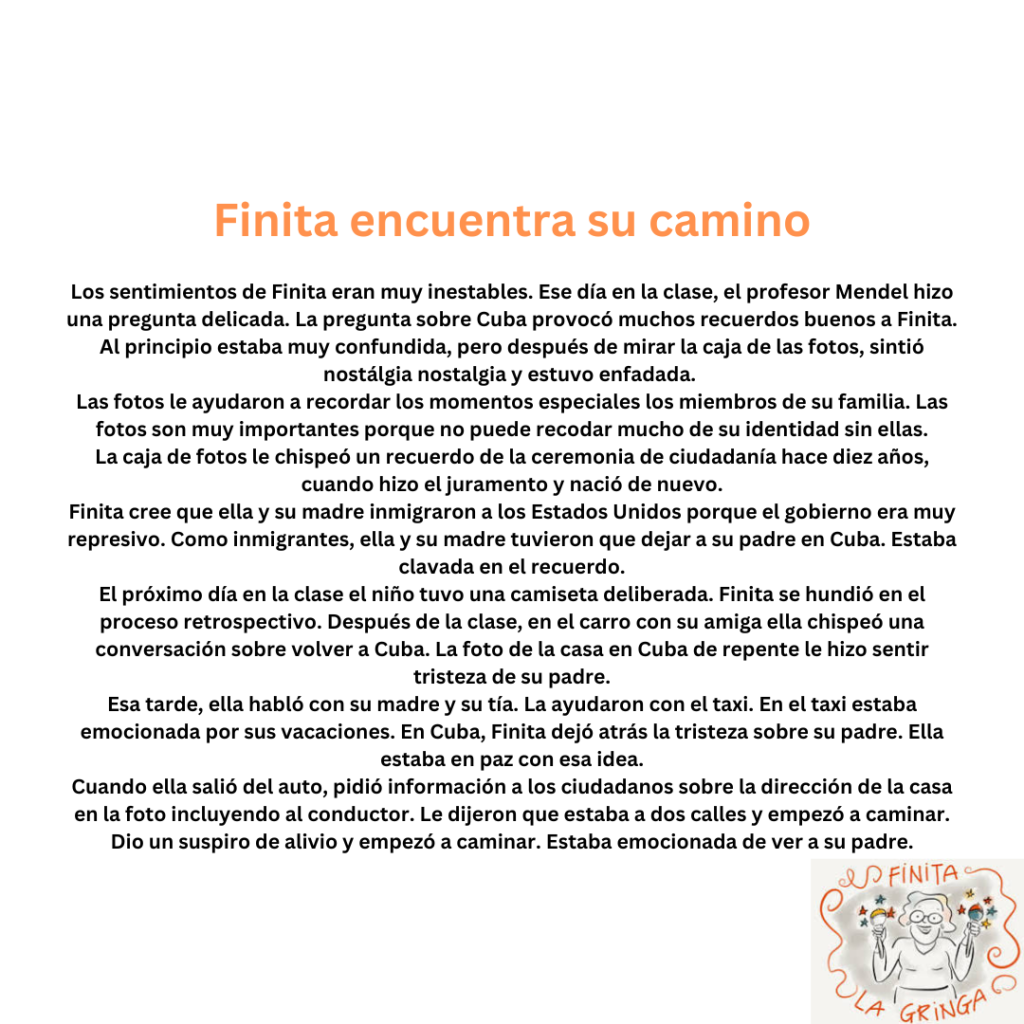
Interpretive Listening
I watched a video called Recuerdos que duelen, 50 años después del 68, “Memories that hurt, 50 years after ’68”. While listening to the interviewees I could hear how the pain caused by a mass murder decades ago still lingers.
Video by: Grupo REFORMA
Horrible things happen everyday but it is difficult witnessing such a senseless act of terror and loss of human life. Watching people take back their power after friends and family were stolen from them is what helped me get through this video. The entire event was compelling. I’m a Journalism major and I would have wanted to cover this story to make people aware of the horrible effects of such an evil event. My takeaway is there isn’t much difference between us when it comes to hard times such as these. There is as much hate in Spanish countries as there is here but hope for a better tomorrow brings us together to fight through the worst days. I respect every one who stood up in this video to say they will not allow this event to be forgotten.
Interpretive Reading
During this semester we read a couple of stories that were very memorable to me. Finita La Gringa, from unit 13, was a standard length story. The other, El Eclipse, was a short story from Unit 15. We analyzed this short story together as a class.
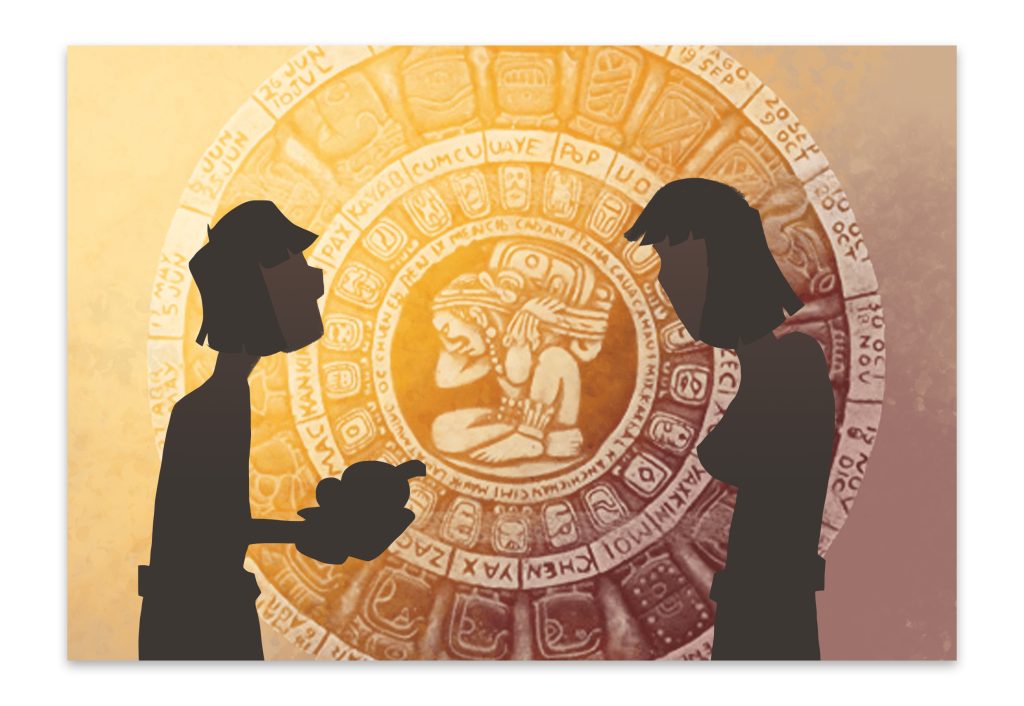
El eclipse Augusto Monterroso (1969)
© 1998 Augusto Monterroso
“Published by arrangement with International Editors’Co.”
The challenge for me was understanding why this story was so significant because I was so busy trying to understand the grammar. I didn’t over come that challenge until we literally broke the story down sentence by sentence. Once we did that I understood the context from a cultural perspective, but I also got a good laugh out of it. The story was about brother Bartolome Arrazola. A religious man who became lost in a Guatemalan Jungle whilst trying to spread his religion. He was found and captured by the natives. They planned to sacrifice him. He spoke their language and tried to use his knowledge of Aristotle to convince them he had control over an impeding eclipse to save himself. Little did he know, they had already predicted the eclipse and by the end of the story his heart was removed from his chest and dripping under the light an eclipsed sun. After that I became more attracted to the analysis to Spanish stories in general. I’ve been reading The Alchemist by Paulo Coelho.